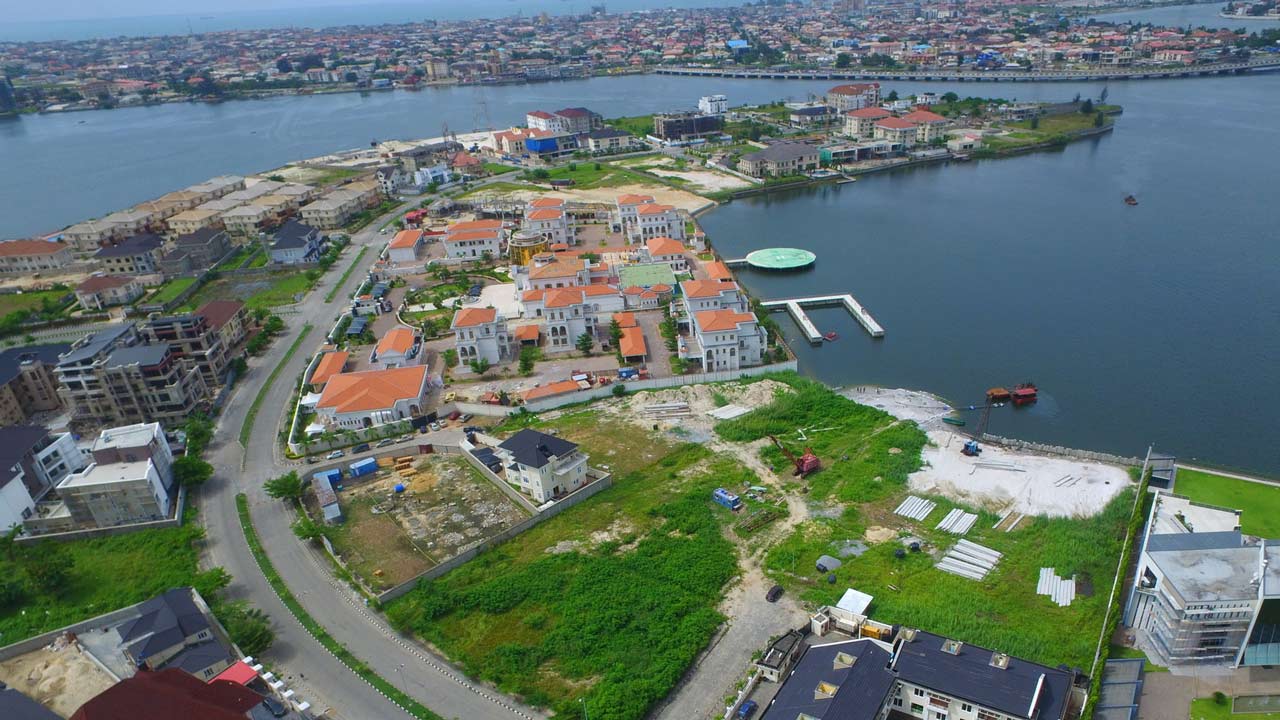 |
| Banana Island |
A new survey released by Lagos State Branch of the Nigerian Institution of Estate Surveyors and Valuers (NIESV) has revealed a slump in property value in Lagos Island and environs.
The report, titled: ‘Lagos Property Market Consensus Report H1 2020’, identified infrastructural stress and increasing densification in the area as major reasons for the slump.
According to the report, Banana Island, Lagos still maintains its status as the most expensive property location in Nigeria and commands the highest value across all property categories, while Victoria Island, home to luxury apartments, flats, maisonettes and penthouses recorded a high rental and sale price for a 4-bedroom house.
Property data from this zone also has a high response rate from serviced commercial and residential uses.
The maiden document endorsed by the chairman, Lagos branch of NIESV, Dotun Bamigbola, is a consensus of 178 Estate Surveyors & Valuers and property professionals in Lagos.
It covers the half-year (January – June) of 2020 with data on rental and sales values of residential and commercial properties from 30 major neighbourhoods across Lagos state.
The document also noted that in terms of house and office types, Banana Island and Old Ikoyi are the upper class markets with both recording an a v e r a g e o f ₦ 1 4 3, 333 / square metres and N105, 263/square metres for office space respectively.
Specifically, the report, indicated that a three-bedroom flat rental goes from N5, 841,835, four bedroom detached rental-N11, 087, 879, three bedroom flat sale-N107, 684, 863, four bedroom detached sale-N240, 773, 801 and average rent for office space-N79, 607, while data was provided by 14 fellows, 86 associate members, and 78 Probationers/Graduates of the institution.
A controlled consensus survey was adapted to ascertain the average property values per location. To achieve this, Lagos State was divided into 7 zones: Island 1 (Lagos Island, Old Ikoyi, S/West Ikoyi, Banana Island, Victoria Island), Island 2 (Lekki Phase 1, Ikate, Osapa, Agungi & Chevron), Island 3 (Ajah, Sangotedo, Awoyaya & Lakowe), Mainland 1 (Surulere, Yaba, Ilupeju & Gbagada), Mainland 2 (Amuwo Odofin, Isolo, Festac, Apapa), Mainland 3 (Ikeja GRA, Maryland, Ikeja & Alausa) and Island 4 (Ogba, Ogudu, Magodo GRA 1 (Isheri) & Magodo GRA II (Shangisha).
Data was generated on the average land prices, 3-bed & 4-bed rental and sale prices and office space prices, in the various locations. Island 1 zone recorded the highest land prices with N322, 229.00 followed by Mainland 3 with N149, 034. This is a reflection of the deepened level of commercialization in these 2 zones. The growing development in nascent Island (2) areas is also reflected in its high price of land averaging ₦112,021/sqm.
The report, which utilised the average residential capital values and rental values in 30 nodes within the state, Chevron showed the highest rental yield of 6.87per cent, next was Agungi 6.31 per cent, while Osapa came in third with 6.06 per cent. The lowest yield was seen in Ogudu – 3.10 per cent, next being Magodo Shangisha – 3.19per cent and third being Magodo Isheri with 3.20 per cent. The median yield in Lagos state from this consensus analysis is 4.32 per cent and it is obtainable in Yaba.
The 16-page report states, “Land and house prices in Island 2 and Island 3 zones are likely to keep increasing as the area welcomes more development.
Major projects like the ongoing Dangote Refinery, Lagos Free Trade Zone, 4th Mainland Bridge and new city – Alaro City, which are all expected to come on-stream in a few years upon completion, will further trigger the rise in property values in the zones.”
“The presence of supporting infrastructure has contributed to the capital value increase in Mainland 4, especially in Ogudu and Magodo Shangisha areas, but this has not met corresponding rental valuation, resulting in lower yields. Ikeja GRA and its surrounding areas like Maryland, Mende, Shonibare estate remains the most expensive locations on the mainland part of Lagos State. This is expected to continue as more residential and commercial development comes up in these neighbourhoods, particularly Ikeja GRA, in few years’ time.”
Bamigbola said data is the singular most important missing factor in the Nigerian real estate market over the years.
According to him, while most advanced economies have moved ahead with the availability of big data, for development and investment decision making by both public and private sector players in real estate and housing, the Nigerian market still suffers from a dearth of data availability.
“With the real estate sector still contributing low to Nigeria’s GDP at seven per cent and in view of the expected growth by all players in private and public sectors over the years, there is need for data to aid the growth of this all-important sector of the economy. This need for data has witnessed the advent of some individual organizations, which have released various real estate outlook reports in recent years. However, the availability of data on an institutional scale to make it credible, measurable and reliable has been the challenge.”
He said the Branch has responded to this call by making available credible and reliable property market data through the report.
According to him, the report came at a challenging time with the closure of the world economy, Nigeria inclusive, due to the lockdown during the COVID-19 pandemic, which is currently being eased out.
The Chairman said the report remains relevant for use by private sector investors both local and foreign, professionals for advisory services and the public sector for measuring market progress and taking developmental decisions, which will affect the sector and the economy at large.
In this article:
